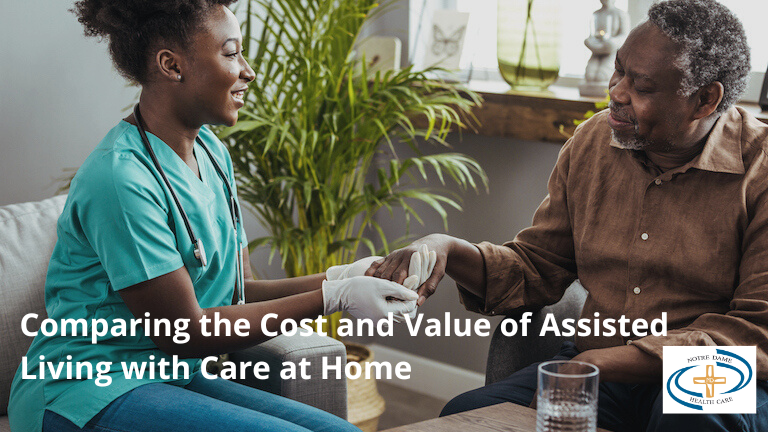For older adults and their families, choosing between an assisted living community and care at home can be overwhelming. It’s also common to assume that care at home is more cost-effective and a better value than assisted living.
How do you decide? We’re here to help you compare the cost and value of assisted living with at-home care.
Assisted Living
Assisted living communities are designed for older adults that want to remain independent but need help with personal care, such as bathing, dressing, toileting, and grooming. Assisted living residents are generally healthy, active, and interested in peer social connections.
According to Genworth’s Cost of Care Survey, the median monthly cost of an assisted living community in the United States is $4,500. The cost of assisted living varies depending on where you live and the level of care required.
To get an idea of the value of assisted living communities, take a look at some of the services and amenities enjoyed by residents at Notre Dame Health Care assisted living:
- Weekly housekeeping and linen services
- Three delicious meals, beverages, and snacks prepared daily
- Up to one hour per day of personal assistance (bathing, dressing, medication reminders, and escorts)
- Full calendar of social, educational, cultural, and spiritual programs
- Transportation
- Onsite medical personnel and health care services
- Exercise and fitness classes
- Choice of spacious studios, one-bedroom, or two-bedroom apartments.
- 24/7 security
Care at Home
According to Health Leaders, 70% of people prefer to remain at home as they age. However, nearly 91% have yet to proactively research the care they may need as they age.
Understandably, many seniors prefer the familiarity and comfort of their homes rather than assisted living, but they don’t always consider the time and money needed to safely and comfortably age at home, especially if healthcare services are required.
According to Genworth’s Cost of Care Survey, at-home care can cost anywhere from $4,957 per month to $5,148, depending on the amount of care and services needed.
Your health and mobility will determine the amount of in-home care you need. You can hire in-home care to help with household tasks such as meal preparation, housekeeping, or errands. A home health aide can help with personal care, such as bathing, dressing, or toileting.
You should also consider if you’ll need the following home modifications:
- Enhanced safety measures such as security systems, fire alarms, medical alert systems, and fall detection technology
- Bathroom upgrades such as grab bars, walk-in tubs/showers, and non-slip flooring
- Ramps
- Widening doorways or hallways
- Stairlifts
- Creating first-floor bedrooms
- Moving to a one-story home
Wrap-up and Next Steps
You now have everything you need to compare the cost and value of assisted living with care at home. Both are great options depending on the needs of the individual.
If you have questions about the cost of assisted living, contact one of the helpful professionals at Notre Dame Health Care.
About Notre Dame Health Care
Notre Dame Health Care (NDHC) offers a range of post-acute programs and services to the community, including an Assisted Living Residence; Adult & Pediatric Hospice and Palliative Care; Post-Acute Recuperation; Short-Term Rehabilitation; Skilled Nursing and traditional Long Term Care; Specialized Memory Care; and an educational resource center which serves our employees and community. We embrace the individuality, spirituality, and wholeness of each member of our community, including our residents, patients, families, volunteers, and staff.
Notre Dame Health Care is proudly non-profit and honored to carry on the mission of the Sisters of Notre Dame de Namur to care for the sick and vulnerable and to educate for life through our NDHC Educational Bridge Center.
Notre Dame Health Care
555-559 Plantation Street
Worcester, MA 01605
(508) 852-5800
notredamehealthcare.org
